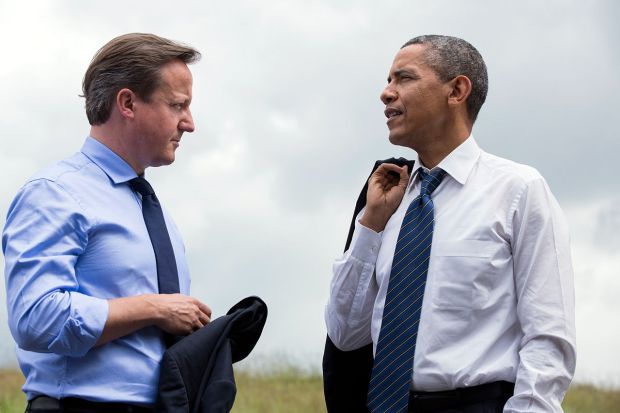June 26, 2016
1. Voting ‘Leave’ means the UK is out of the EU
Wrong.
Voting is voting; it’s an instruction to Parliament, not an automatic trigger. You may have heard ‘Article 50’ mentioned a couple of hundred times in the last 48 hours. That’s the EU version of the big red button that a country presses to put the red alarm light on and start evacuating. OK I’m dramatizing. Invoking Article 50 kicks off the process of negotiation with the EU on who gets the couch and who gets the summer house; you get what I mean. This process can take up to 2 years, during which time both parties negotiate a deal for future relationship, at which point the country is considered to be outside the EU.
But, and this is a very big but, the process doesn’t actually start until the UK pushes that big red button. And here’s the sweetest part; Brussels cannot push it themselves. How’s that for a pressure situation? So in reality, from a legal perspective, nothing has actually changed in the immediate term. The UK still has to ‘abide’ by EU law, and British citizens still have all their EU rights. The downside is that the legal picture isn’t the only picture. We’ve all seen Sterling take a kick in the groin, and that has a number of effects on financial institutions. Nevertheless, those actually conversant with Sterling and the FTSE share index can tell you that the hit was not as bad as the Remainers were forecasting.
Bottom Line
This vote says Britain wants to leave, but the actual process of leaving is one that needs to take its time and be done right.
2. The markets have crashed
Wrong.
This has been widely miscommunicated and abused by one side of the argument. I hate to nitpick, but being a data analyst I can’t let this one slide.
So as soon as it was clear Brexit was going to cross the finish line, we all saw Sterling take a fall. It fell from 1.50 dollars to 1.30 dollars, and from 1.31 euros to 1.20 euros.
What we also need to keep in mind here is that that drop happened during what is called ‘overnight trading’. This trading is not during the usual market times, and happens in smaller volumes. By morning, Sterling had climbed back to 1.36 dollars and 1.23 euros, and by the end of the day it had stabilized at those values, in part due to the actions taken by the Bank of England.
That morning, people were flooded with the idea that this hadn’t happened to Sterling since 1985, leading people to believe that Sterling hadn’t been this low or weak for decades, prompting a lot of posts on social media suggesting Sterling was now garbage and British wouldn’t be going on holiday for a very long time.
If you actually look at the numbers and charts, it’s clear that the high dip was partly due to Sterling having gone up when markets thought that a Remain vote would win. We call this ‘pricing in’ a Remain vote. When the opposite became clear, the market adjusted.
Most of us saw this view after Brexit was confirmed. (original graphs courtesy of XE.com)
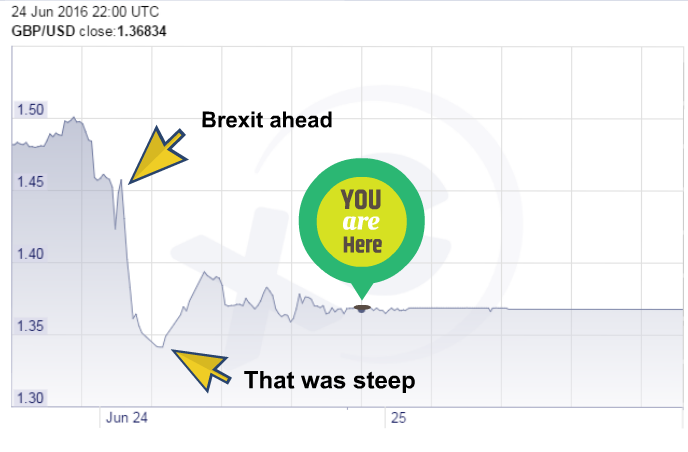
Natural reaction? Holy %$#. Looks dreadful right? Yes, Sterling took a dive from 1.5 dollars to 1.36 dollars. But is it the weakest it’s been since 1985?
Let’s take a look of Sterling against Euro over a wider time frame..
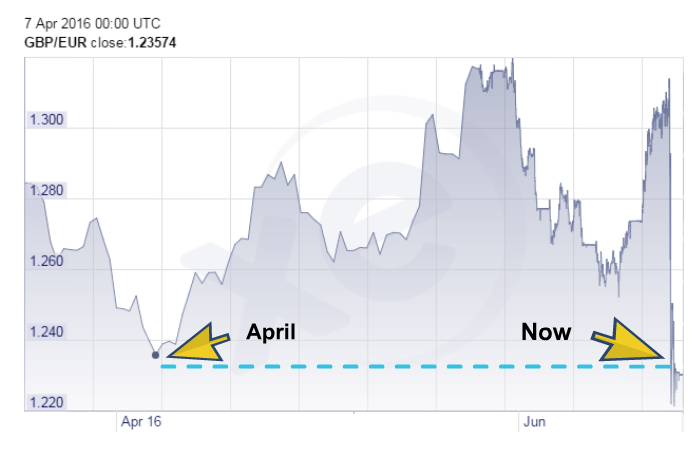
Well what do you know? Last April Sterling was also at 1.23 euros. Hmmm.
Many will justify this as nerves because of the referendum itself. Correct. The last time that Sterling was at 1.23 against the Euro before that date was 2014, 9th June 2014 to be exact. And you know what else? Just take a look at the graph before that date; Sterling was actually lower against the Euro.
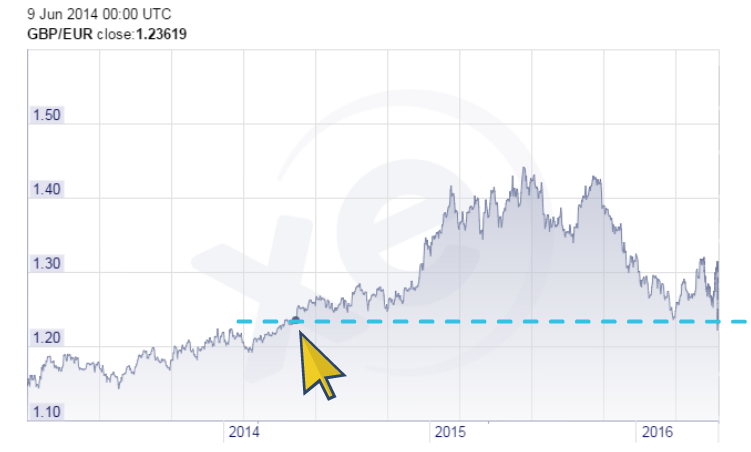
What does this mean?
- Sterling was not at its worst since 1985. The correct statement is that Sterling hadn’t taken such a sharp dip in one day since 1985, but given that the country had just decided to leave a union it’s been in for the last 40 years, one can expect a dip.
- The so called Armageddon post referendum scenario is not even as bad as the recession scenario from pre 2014.
You know what else? All the talk about the stock market taking a hit? Did you know that on Friday 25th June (the day after the referendum), the FTSE100 actually closed higher than the previous Friday? You probably didn’t, because that’s not the message the Remainers were putting out there.
Bottom Line
Expect some market volatility, but the situation has already stabilized, and the Bank of England has made assurances that there are plenty of contingencies in place to weather this period of uncertainty. Will Sterling be back up to 1.31 next week? Not a chance. Does that mean the economy is in the tank? Well if it wasn’t in the tank last April then it isn’t in the tank now at the same price.
So when should we get worried?
If there comes a time when market trading is suspended to prevent further losses, that’s the time to worry. For now that doesn’t seem to be happening.
3. The UK now has 350 million a week to spend
Not really.
This figure by the Leave campaign has caused many a scuffle in the last weeks and months. They sold the amount to the British public and insinuated that one may decide to put that money towards the NHS.
Saying that is like getting a 5000 pound raise and saying ‘ye I can spend that on a boat’. Yes you could. And you could also drive a car with your feet but it doesn’t make it a good idea. In reality you might get away with spending 2500 on a boat and the rest on keeping the other parts of your life afloat. That’s how reality works.
The other fit the Remain camp had is because the 350 million figure is more of a gross amount, which means it doesn’t factor in what the UK gets back from the EU in other forms. When you factor that in, the number becomes more along the line of 250 million. Does that mean it shouldn’t be a factor? From the way people voted, clearly 200 million a week is still a chunk of change.
How that is ‘spent’ will now be up to the treasury, and only post-exit. For the time being, as we’ve already said, the UK keeps paying its membership fee, and EU keeps paying those lovely grants, project funds and agriculture subsidies everyone loves so much. If and when the exit becomes final, and the UK sends its last membership fee with a nice little ‘see you later’ bow, the treasury better have a solid plan on how to redistribute that money to make up for all the things the EU won’t be paying for anymore. There’s undoubtedly going to be a long list of people anxiously waiting to see whether they will still get their grants, project funding and subsidies. This rules out the possibility of spending it all on something like the NHS. It’s just not practical or fair.
Clearly, the treasury’s job has become a lot harder, as even though it will have a bit more coin in its budget, it needs to factor in a lot more Oliver Twist hands.
Bottom Line
The 350 million is more like 250, and the chances of it being sent to just one cause like the NHS, is slim to none.
4. The older generation has doomed the younger one
Maybe. Maybe not.
This is a tough one. Polls suggest that there is a clear demarcation between the young vote and the older vote. The older bracket seems to have gone strongly for a Brexit, while the younger generation went for Remain.
The reasons for this can be many and varied. One can only speculate, so best stick to things we actually do know.
a) Traditionally, younger people have very poor turnout at elections. In the 2010 UK General Election, only 50% of the 18 to 24s turned out to vote. In the previous 2 General Elections it was even lower than that.
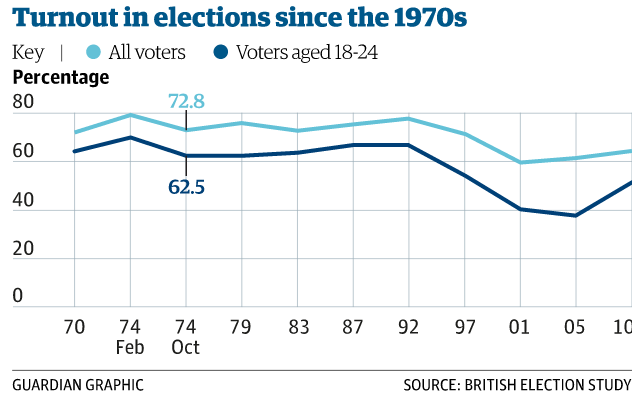
This suggests that historically, the younger voters tend to be more out of touch with the political landscape and matters that extend beyond their immediate line of sight. If you ask me, yes younger people should speak up about the EU, but they’ve been consistently not doing their homework on the political landscape, so expecting to come and vote in a referendum and pretend to know all the facts is somewhat foolish to say the least.
b) Older people have spent more time in the EU, and have seen it evolve. They’re the generation that have seen the EU grow from a couple of nations to the 28 (soon to be 27) bloc organization it is today. The shape and form of the EU has changed substantially since the last question on the UK’s membership of the EU, and clearly this has not pleased a lot of people.
c) Young tend to benefited more from the EU. The EU has a good social and economic policy when it comes to young people having opportunities. Any student who has taken a semester abroad, or applied for work within the EU bloc of countries no doubt sees the EU as a godsend. In this regard, the EU makes movement much easier, and that makes finding jobs and experiences easier. Whether those young people would still feel the EU is a wholly positive project in their later years is another matter.
Bottom Line
History will judge this move in its own time, and sentiments of ‘doom’ from today may be forgotten if the UK comes out stronger within 5 years. At the very least, the older generation should be respected as the ones that did not have it easy. They did not have free grants and Erasmus experiences that we take for granted today. If they voted to remove EU management and start paying for those things from the Treasury’s coffers, they must have thought that what the EU management took in return was something far greater than what it was giving. Time will tell.
5. This will trigger the end of the EU
Maybe. Maybe not.
The EU has been going through some tough times in the last decade. Euro skepticism is on the rise, and far right parties across Europe are gaining traction. The prospect of a country leaving the EU has been held next to Armageddon for a number of years now. We do not have to go far back to remember the uncertainty caused in Grexit times, when Greece was in such a bad state that it was considering leaving the EU.
Greece and the UK’s circumstances are vastly different, but they both indicate an undertone of discontent. Many have speculated that a Brexit will create a domino effect across the EU nations, and make it more probable that others get the courage to exit. From the reactions of EU leaders in the last 24hrs it is clear that this is a credible fear, and there is a mad scramble to send a clear message to EU nations that UK will be dealt with harshly so as to avoid a contagion effect (i.e. other countries also jumping ship).
Whether this will actually lead to the end of the EU is anyone’s guess. In an ideal world, the EU takes some hard lessons away from this, and goes on a path to re-affirm it’s values and re-instill democracy into its institution; reducing red tape and devolving certain powers back to the individual EU nations. Over time, the EU and the UK can be important strategic partners. The UK may even be considered an associate partner.
Bottom Line
It all depends on the stance taken by the EU. If it stomps its feet and plays the bully card as it did with Greece, the opportunity for reform will pass and the negative undercurrents will continue to fester.
Let’s all hope for the first picture. I like that picture.
6. Scotland will become its own country
Could be, but I doubt it.
Look, let’s not pretend there aren’t forces at play that have been itching for an excuse to call another referendum on independence. That will always be the case. Did this give them that excuse? It definitely did. But is breaking away from the United Kingdom what Scotland really wants?
Let’s not forget, this question was put to the Scottish people only 2 years ago, and it was strongly rejected at 55.3%, with a very high turnout of 84.6%.
I know what you’re thinking..’But that was before the UK decided to call it quits with the EU’. Right?
True, but an ICM poll for Scotland On Sunday newspaper asked Scots whether they would want an independence referendum if the UK voted for Brexit against Scotland’s will. The results of that poll found that 48% are against a post-Brexit vote on independence, and 44% are for it (8% don’t know) , which indicates that although there would be some movement in sentiment, it would not be earth shattering. Let’s keep in mind, this is just a poll, and polls have been wrong before; just ask Ed Milliband.
But aside from all that; Scotland calling it quits with the United Kingdom isn’t straightforward, and Scotland needs to think long and hard about what it will be giving up to gain a seat at the big EU table, an EU table that is not well known for giving much regard to what proud countries such as Scotland think when it comes to issues they disagree on.
Bottom Line
Sure Scotland can leave the UK, but Scotland might well find itself bordering a non EU country and have very few EU allies, with its biggest historical ally waving a nostalgic flag across the border.
7. There will be another EU referendum
Wrong. Unless someone redefined ‘Democracy’ and I missed it.
In the last 24 hours, a key petition has been put forward to have a do-over of the referendum. At the time of writing this piece, it stands at over 2 million people signed. That’s quite a number. We should stop and think. Maybe we should actually set a new date and redo this referendum because hey, 2 million is a big number.
Sure let’s do that, and let’s also ditch democracy and the 17.4 million that voted to Leave.
What kind of democracy would it be if we had do-overs? Never mind the countless resources that would need to be mobilized and expended, as well as the fatigue that the country is already under because of the months of non-stop campaigning, what would this really achieve?
When’s the last time we had a do-over on an election? Never. Why? Because it doesn’t work that way.
What’s funny is, Sky News actually went to the trouble of setting up a #Bregretters tag to give people that voted Leave and are regretting it an opportunity to speak up. Last I checked it didn’t get much traction and that’s saying something.
Sour grapes anyone?
Bottom Line
The best thing for the country right now is to present a strong United Kingdom that is ready to negotiate with the EU and get the best deal it can. Petitioning for a another referendum is not helping anyone get on with it.



